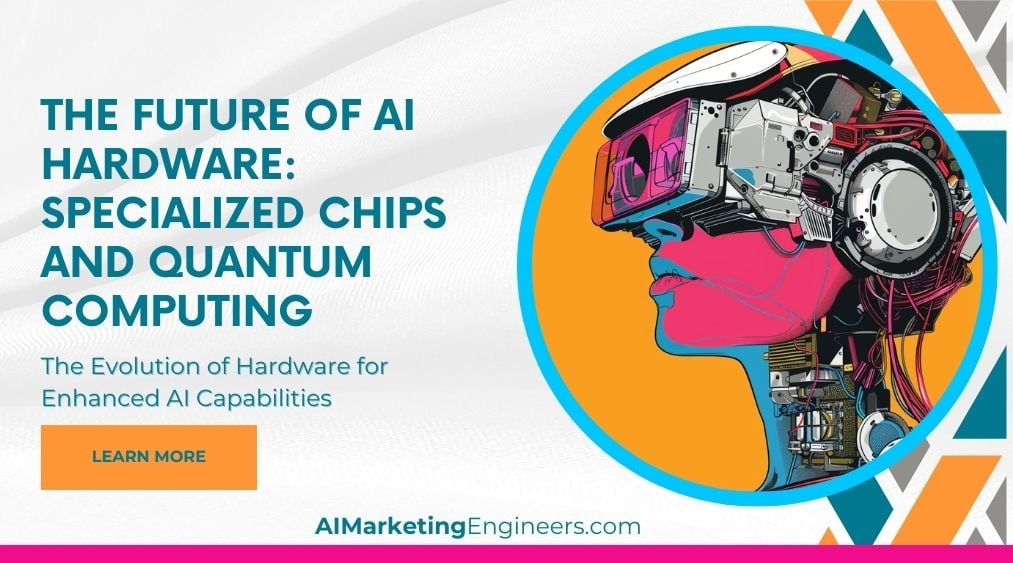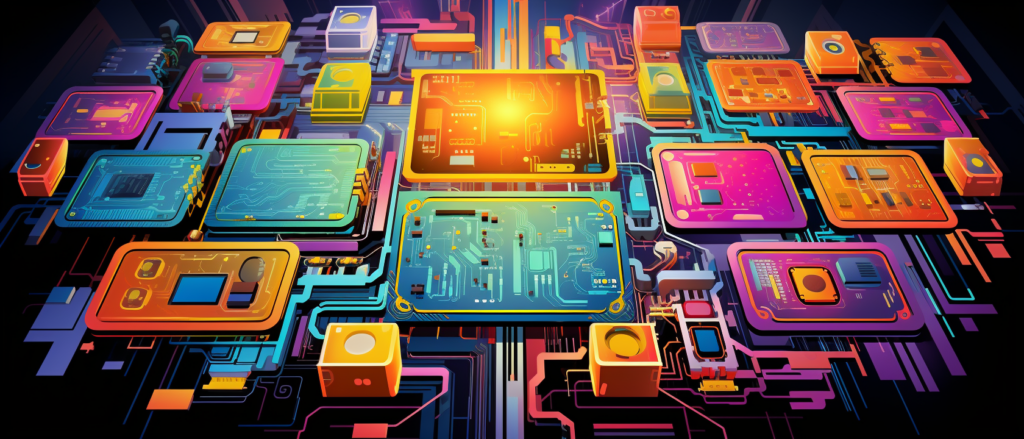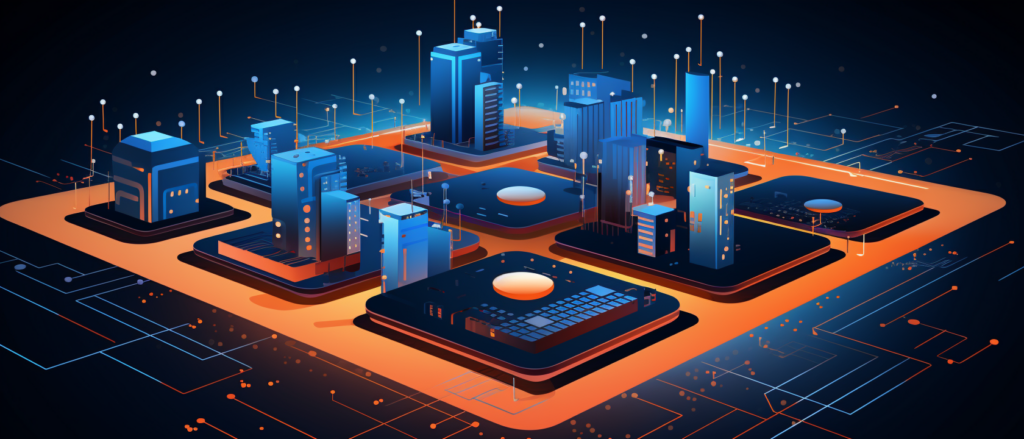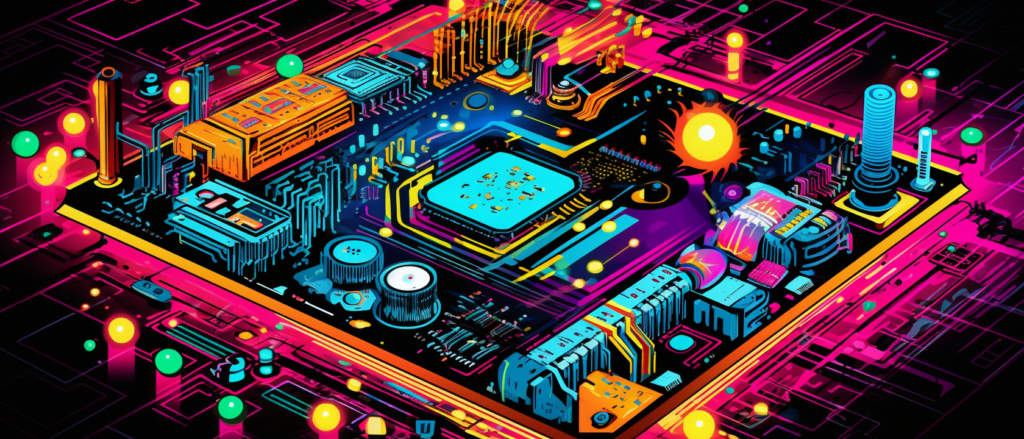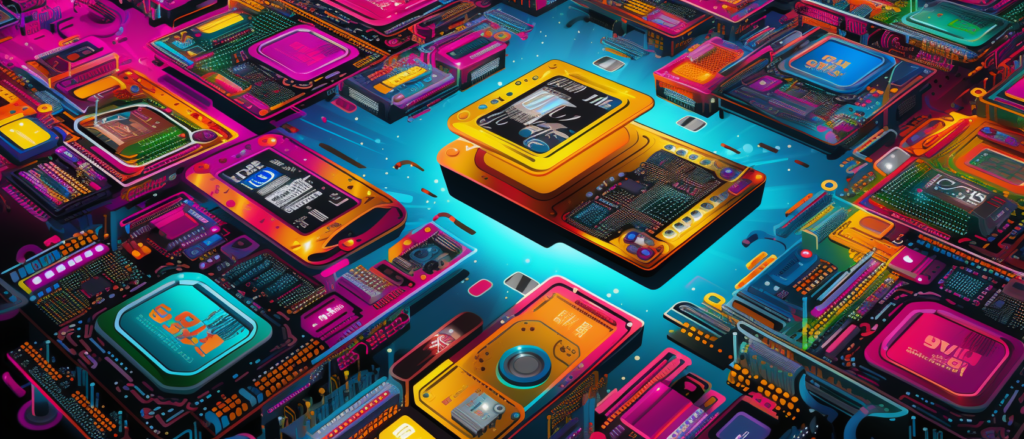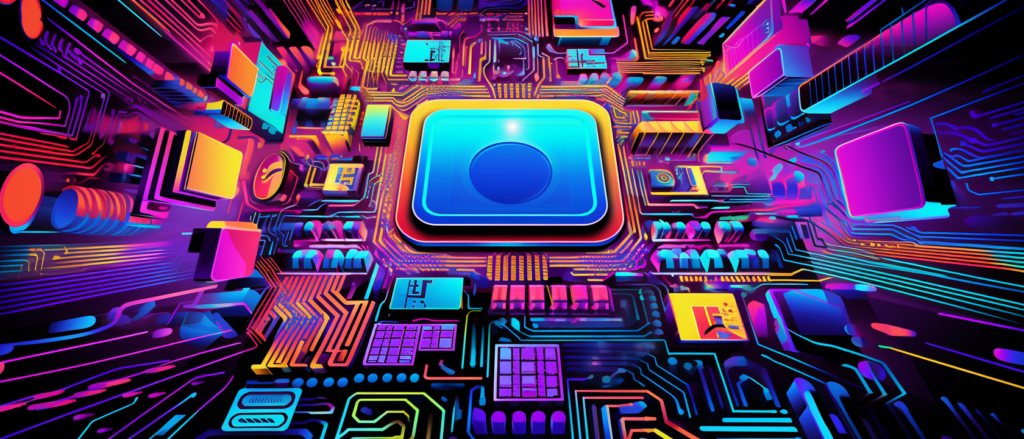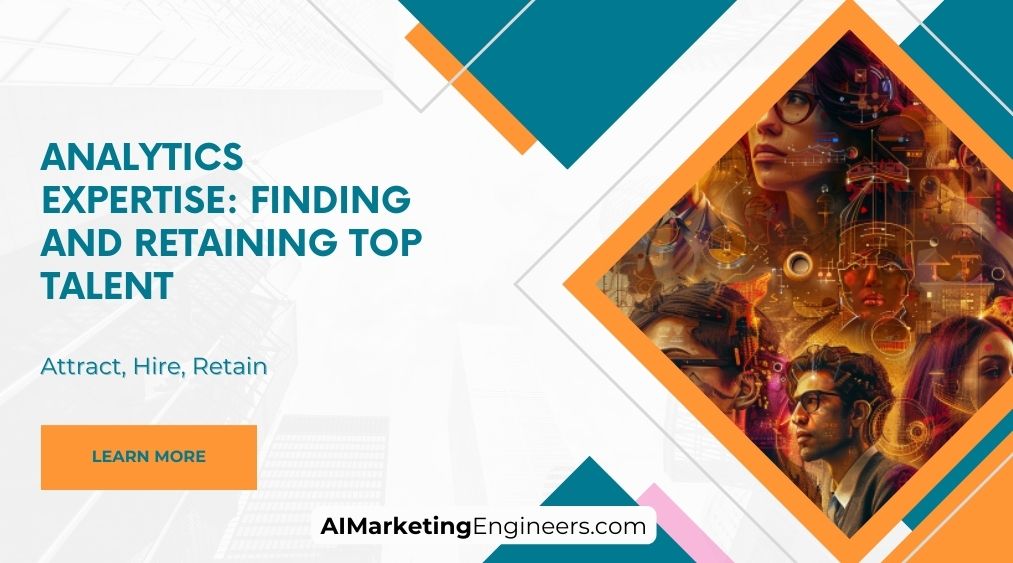Key Takeaways
✅ Specialized Chips: Custom-built for AI applications, these chips are the high-octane fuel for the complex engine that powers machine learning, making everything faster, smarter, and more efficient.
✅ Quantum Computing: Welcome to computation with a quantum twist, offering a pace of processing that could turn the AI world on its head, blazing through tasks once thought insurmountable.
✅ Integration and Collaboration: When specialized chips shake hands with quantum computing, it's not just a meeting of minds but a fusion, sparking a synergy that could create the next leap in AI advancement.

Introduction
Have you ever wondered what it takes for technology to learn like us—or dare I say, even outsmart us? It starts with a good brain, and that's exactly what AI hardware provides. But catch this, as AI grows like a beanstalk, the tech needs to keep pace, and not just any pace; we're talking hyperspeed! Enter the world of Specialized Chips for AI. We're talking about digital brains—GPUs, TPUs, you name it—that are crazy good at handling the heaviest AI tasks without breaking a sweat. Imagine these chips as the hot-rod engines in AI's race car, giving it the oomph to zip past the finish line of complex calculations and data crunching.
But wait, there's more. Ever heard of Quantum Computing? It's like if your computer had superpowers to process info in ways you'd think were impossible. This isn't your typical number cruncher; it's technology that uses quantum bits, making traditional computers look like snails in a dash. Swinging back to our story, there's a twist: the hybrid systems where the regular chip tech buddies up with the quantum wizards. This tag team is all set to take us to a world of AI possibilities that'll knock your socks off.
Intrigued? I knew you would be. Stick around as we dive into these waves of change, surfacing not just the 'whats' and 'hows,' but the 'whys' that could really shake things up for businesses and our everyday lives. There are insights galore and maybe, just maybe, some secret sauces to give businesses that edge they're craving for. Are you ready to discover what AI gadgets of the future will be packing under the hood? Let's get this revolution rolling!
Top Statistics
| Statistic | Insight |
|---|---|
| AI Chip Market Growth: Expected to hit $91.19 billion by 2025, zooming up at a CAGR of 40.2% from 2020 to 2025. (Source: Grand View Research) | What does this mean? It says that businesses and consumers alike are hungry for smarter, faster tech. This kind of growth isn't just impressive; it's explosive. |
| Market Share: GPUs led the charge in 2019 with 43.8% of the AI chip market share, followed closely by ASICs and FPGAs. (Source: Grand View Research) | Graphics processing units (GPUs) aren't just for video games anymore; they're one of the hot tickets driving AI forward. |
| Investment in Startups: AI chip startups saw investments reach a whopping $2.2 billion in 2020 - that's up 43% from 2019. (Source: CB Insights) | Investors are betting big on small companies, which might just come up with the next big breakthrough in AI. Are you paying attention to these underdogs? |
| Quantum Computing Ascension: This market is all set to climb from $472 million in 2021 to $1.76 billion by 2026, coasting at a CAGR of 30.2%. (Source: MarketsandMarkets) | This isn't science fiction; it's the science of tomorrow. And it's set to turn industries like finance, healthcare, and defense on their heads with its potential. |
| North America's Quantum Dominance: In 2020, North America secured 40.1% of the quantum computing market. (Source: MarketsandMarkets) | A tech titan today, North America seems keen on keeping its lead in the quantum race. Wonder where Europe and Asia stand in this global tug-of-war? |
The Impact of AI on Hardware
Have you ever stopped to think about how much artificial intelligence (AI) is changing the world around us? From the way we shop online to the little virtual assistants in our phones, AI is making things smarter and faster. But here's the catch - to keep up with the smart software, the computers themselves have to get a whole lot better. That's where advanced AI hardware comes in, making sure our digital buddies don't hit a speed bump.
Specialized Chips for AI Magic
Let's talk about the muscle behind AI - the specialized AI chips. You've probably heard of GPUs, right? The thing that makes games look pretty. But they're also AI whizzes, alongside their specialized friends like TPUs, FPGAs, and ASICs. These chips are like the Olympic athletes of processing; they’re faster, stronger, and more efficient. They can juggle a ton of AI tasks without even breaking a sweat. Companies like NVIDIA, Google, and Intel are the ones pumping iron in this gym, crafting these chips to meet the growing demands of AI.
Quantum Computing - The Quantum Leap
Now, if we’re looking ahead, there's this shiny new thing called quantum computing. Imagine if your computer could solve huge, complex puzzles faster than you can snap your fingers. That's where quantum can take us, especially with AI. It's not all roses, though, since it's a bit like teaching a fish to climb a tree at the moment. Quantum computers are promising, but boy, do they have issues like scalability and error correction. But the brainiacs are on it, working hard to iron out the kinks.
Hybrid Quantum-Classical Systems
So, what if we mix the old and the new? The classic and the quantum? That's what hybrid quantum-classical systems are about. It's like having a chocolate-vanilla swirl cone – you get the deliciousness of both in every bite. This combo could potentially give AI tasks a supercharge in speed, and efficiency while keeping things accurate. Giants like D-Wave, IBM, and Google are tinkering away, trying to blend these two worlds seamlessly.
How AI Hardware Could Change Our Lives
Ever thought about how these super-smart chips and quantum thingamajigs will shake things up in the future? We're talking big changes in healthcare, finance, and transportation. But it's not just about making money or fancy new gadgets; it's also about the tough questions. Like, what happens to jobs when the robots can do it all? Or how do we make sure our private stuff stays private? Yep, advanced AI hardware brings up some ethical considerations and challenges we need to sort out.
Looking Into the Crystal Ball of AI Hardware
Peeking into the future, what can we expect from the world of AI hardware? More investment and brain power are going into these areas, so we're certainly not slamming on the brakes anytime soon. It's clear that the path ahead for AI development heavily relies on the new, snazzy hardware we create. And one thing is for sure - it's an exciting ride, full of incredible possibilities and some head-scratching challenges. Let's see where this rocket ship takes us!
AI Marketing Engineers Recommendation
Recommendation 1: Invest in Specialized AI Chips: Dive into the future armed with technology that's tailored for your needs. Have you ever noticed how some computers are just faster and smarter at doing certain tasks? That's not by accident. It's because they have chips designed to handle specific jobs really well. With AI becoming more sophisticated every day, using specialized AI chips can be a game-changer for your business. They can process data faster than general-purpose processors, giving you a serious edge in speed and efficiency. And the best part? They're getting more affordable, so even small players can join the big league. Imagine cutting down on wait times and upping your customer satisfaction. Who wouldn't want that? So why not look into these chips and see how they can revamp your tech gear?
Recommendation 2: Keep an Eye on Quantum Computing Trends: Have you ever wondered what the world will look like when computers become unimaginably powerful? Quantum computing is a bit like having superpowers in the digital realm. It has the potential to solve complex problems that our current computers would need centuries to crack! And guess what? It's making strides in the market. If you stay tuned to the trends related to quantum computing, you'll be ahead of the curve in leveraging this revolutionary technology. It's not just about the power though—it's about prepping now for the data security challenges and algorithms quantum computing will bring along. So, start following the quantum conversation. It might be a bit dense at times, but it's going to be worth it. Who knows? You could be pioneering ways to market in a quantum world.
Recommendation 3: Explore Quantum-Ready Analytics Tools: Now, let's talk about practical tools because, let's face it, we're all about getting things done. In the not-so-distant future, quantum computing will likely shift how we do analytics, providing insights that we can barely imagine today. My advice? Begin exploring quantum-ready analytics tools that are starting to pop up. These tools could one day give you the power to analyze massive amounts of data at breakneck speeds. Picture being able to understand your customers' needs and market trends almost instantaneously. That's the promise of quantum analytics. By being an early adopter, you can set your business up for success, keeping you one step ahead in the data game. Why not start scouting for these tools and see if there are any pilot programs or partnerships you can join? Your future self will thank you.
Relevant Links
Revolutionize Your Marketing Strategy with AI: Start Now!
Quantum Computing and AI: The Future Is Here!
AI's Role in Brand Strategy: Adapt or Get Left Behind
AI Advances in Marketing: Are Jobs at Risk? What You Need to Know
AI in SEO: Is It the End or a New Beginning? Stay Ahead of the Game
Conclusion
When we pause and think about it, isn't it remarkable how far we've journeyed with AI technology? As we've discovered, it's not just the software that's sprinting ahead, it's also the powerful engines driving it – the AI hardware. These specialized chips, like GPUs and TPUs, have already redefined what we thought was possible, cutting down the time it takes to process mountains of data into mere moments. And then there's quantum computing, which feels like something straight out of a sci-fi fantasy, still in its infancy but with the promise to unlock doors we didn't even know existed.
Have you ever wondered the kind of problems we could solve with such speed at our fingertips? Imagine the breakthroughs in healthcare, finance, and transportation. There's genuine hope here, but there's also a twinge of trepidation. Will there be challenges like job security, privacy, or even ethical dilemmas? Probably, and that's why we need to tread thoughtfully into this new territory.
We've glimpsed companies like NVIDIA and Google pushing the envelope, not content with the status quo. In this journey, we're partners with these pioneers, sharing the excitement for what's to come. This alliance of classical and quantum computing powers is not just expanding the horizons of AI capabilities, but it's also a testament to human ingenuity.
As we look towards a future speckled with the potential of AI hardware advancements, let's stay curious and supportive of the research and investment needed to keep the momentum going. The story of AI's evolution feels like it's just getting started, and we're all characters in it. What role will we play, and how will we adapt and grow with these technological wonders? The next chapter is ours to write, and it's bound to be an exhilarating one.
FAQs
Question 1: What are specialized AI chips, and how do they differ from traditional CPUs and GPUs?
Answer: Specialized AI chips, also known as AI accelerators, are tailored to handle machine learning and deep learning algorithms efficiently. They've been fine-tuned to be really good at AI-specific tasks, like crunching numbers in a way that's much snappier and energy-smart compared to your everyday CPU or GPU.
Question 2: What are the most common types of specialized AI chips?
Answer: You'll mostly come across:
- Graphical Processing Units (GPUs),
- Field-Programmable Gate Arrays (FPGAs),
- Application-Specific Integrated Circuits (ASICs),
- Tensor Processing Units (TPUs), and
- Neural Processing Units (NPUs).
Question 3: How do quantum computers differ from traditional computers?
Answer: Quantum computers are quite the brainiacs—they work with qubits instead of plain old bits, which lets them tear through certain calculations at lightning speed. Thanks to quantum mechanics—which is like the rulebook for particles on the super-tiny scale—they can crack problems that traditional computers can't even touch.
Question 4: What are the potential applications of quantum computing in AI?
Answer: Quantum computing could really rev up AI, making algorithms learn faster and tackle heftier problems. Imagine super-quick drug discovery, financial predictions, smarter supply chain management, and even chattier language processing AI.
Question 5: What are the challenges in developing and scaling quantum computers?
Answer: It's not a walk in the park. Issues like qubit stability (they really can't keep still), the fancy error checking needed, and the super chilly temperatures required, make it tough. Plus, there just aren't enough quantum wizzes out there right now.
Question 6: How can professionals and enthusiasts stay updated on the latest developments in AI hardware?
Answer: Keeping pace with AI hardware can be fun! Dive into research papers, industry reports, tune into big conferences, or check out niche AI and quantum computing news. Don't forget to mingle in online forums, crash a workshop, or code away at a hackathon.
Question 7: What are the key factors to consider when choosing AI hardware for a specific application?
Answer: When picking out your AI hardware, think about computing power, how much energy it sips, cost, how easy it is to program, and whether or not there's good software and tool support.
Question 8: How can AI hardware be used to address ethical concerns and biases in AI systems?
Answer: The right hardware can make AI systems clearer and more upstanding. For instance, specialized chips could speed up the making of fair AI models, and quantum computing could safeguard AI integrity and security.
Question 9: What is the future outlook for AI hardware, and how will it impact the broader AI landscape?
Answer: The horizon's looking bright for AI hardware. From snazzy chips to quantum leaps, as these gadgets evolve, they'll power up AI, taking it to new heights and shaping the future of different industries.
Question 10: What skills and knowledge are necessary for professionals to work in the field of AI hardware?
Answer: To dive into AI hardware, you should be solid in computer design and coding. Plus, knowing a thing or two about machine learning and quantum computing isn't just nice—it's pretty much essential.
Academic References
- Dally, W. J., & Ho, S. (2015). Specialized Hardware for Deep Learning: A Tutorial and Performance Analysis. IEEE Transactions on Parallel and Distributed Systems. In this insightful paper, Dally and Ho give us a tour of the specialized hardware designed for deep learning tasks. They explain how GPUs, FPGAs, and ASICs fit into this landscape and evaluate their performance across various applications—a must-read to understand the backbone of deep learning efficiency.
- Havlicek, V., Córcoles, A. D., Temme, K., Harrow, A. W., Kandala, A., Chow, J. M., & Gambetta, J. M. (2019). Quantum Computing for Deep Learning. arXiv preprint. Havlicek and his team take us on a journey through the quantum realm, debating how quantum computing can revolutionize deep learning. They're not just theorizing; they propose a tangible hybrid quantum-classical approach to show us the possibilities ahead.
- Wang, Z., Hadfield, S., Jiang, Z., & Rieffel, E. G. (2018). Quantum Approximate Optimization Algorithm for Deep Learning. arXiv preprint. Wang et al. introduce us to QAOA, a quantum algorithm with the promise to enhance neural networks. Experience their vision on harnessing the power of near-term quantum hardware to boost deep learning's capabilities—a promising peek into the future!
- Choi, J., Venkataramani, V., Srinivasan, V., Kaul, H., Raghunathan, A., & Kurdahi, F. (2018). A Survey of Specialized Hardware for Deep Learning. ACM Computing Surveys. Choi and colleagues compile a thorough overview of the tools available for deep learning's heavy lifting. They dissect GPUs, FPGAs, ASICs, and neuromorphic chips, presenting their pros and cons, and emphasizing their impact on performance—an essential primer for any AI aficionado.
- Biamonte, J., Wittek, P., Pancotti, N., Rebentrost, P., Wiebe, N., & Lloyd, S. (2017). Quantum Machine Learning. Nature Reviews Physics. In this comprehensive review, Biamonte and his co-authors map out the intriguing landscape at the intersection of quantum computing and machine learning. They outline the potential uses of quantum algorithms and acknowledge the challenges we face—this article is a glimpse of the mountain we aim to climb.
- Arrazola, J. M., Bergholm, V., Biamonte, J., Braje, D., Bromley, T. R., Collins, M. J., … & Weedbrook, C. (2019). Near-Term Quantum Computing for Machine Learning. Nature Machine Intelligence. Arrazola and the team share insights into how near-term quantum computers might lend their might to machine learning. With discussions ranging from quantum-enhanced optimizations to generative models, plus a proposed development roadmap, this paper is a beacon for explorers of quantum machine learning's frontiers.
- Esmaeilzadeh, H., & Blem, E. (2019). Specialized Hardware for AI and Deep Learning: Landscape, Opportunities, and Challenges. ACM Computing Surveys. Esmaeilzadeh and Blem delve into the burgeoning world of AI hardware, surveying the vistas of GPUs, FPGAs, ASICs, and neuromorphic chips. They ponder over the formidable opportunities and challenges that lie in creating and deploying these specialized systems—key reading for those shaping the future of AI.
- Preskill, J. (2018). Quantum Computing and Machine Learning: What to Expect and When. arXiv preprint. Preskill opens the curtain to reveal a stage set for a revolution. He examines when and how quantum computing might intersect with machine learning, offering us a roadmap through the labyrinth of developing quantum algorithms and hardware—a paper that amounts to a compass for navigating an imminent transformative era.
